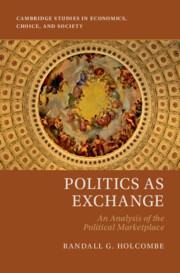Refine search
Actions for selected content:
13 results
13 - Constraining Leviathan
-
- Book:
- Politics as Exchange
- Published online:
- 23 October 2025
- Print publication:
- 06 November 2025, pp 230-249
-
- Chapter
- Export citation

Politics as Exchange
- An Analysis of the Political Marketplace
-
- Published online:
- 23 October 2025
- Print publication:
- 06 November 2025
Chapter 2 - Thomas Hobbes, Born with Fear
-
- Book:
- The Social Contract
- Published online:
- 30 May 2025
- Print publication:
- 04 September 2025, pp 13-28
-
- Chapter
- Export citation
Chapter 6 - The Later 1650s
-
- Book:
- Milton's Ireland
- Published online:
- 14 November 2024
- Print publication:
- 12 December 2024, pp 145-161
-
- Chapter
- Export citation
Chapter 14 - What Is Living and What Is Dead in Collingwood’s New Leviathan?
- from Part II - Issues in Collingwood’s Philosophy
-
-
- Book:
- Interpreting R. G. Collingwood
- Published online:
- 22 November 2024
- Print publication:
- 05 December 2024, pp 262-279
-
- Chapter
- Export citation
3 - Necessities, Natural Rights and Sovereignty in Leviathan
-
- Book:
- The Necessity of Nature
- Published online:
- 16 February 2023
- Print publication:
- 23 February 2023, pp 76-104
-
- Chapter
-
- You have access
- Open access
- HTML
- Export citation
Chapter 8 - Shedding New Light on Thomas Hobbes’s Leviathan (1651)
- from Part III - Seventeenth- and Eighteenth-Century Plutarch
-
- Book:
- Plutarch's Prism
- Published online:
- 22 September 2022
- Print publication:
- 29 September 2022, pp 293-317
-
- Chapter
- Export citation
4 - Tempering Apocalyptic Ideals: Hobbes and Pretenders to God’s Kingdom
- from Part II - Historical Case Studies
-
- Book:
- Apocalypse without God
- Published online:
- 14 April 2022
- Print publication:
- 21 April 2022, pp 92-118
-
- Chapter
-
- You have access
- Open access
- HTML
- Export citation
3 - Scripture Atomized
-
- Book:
- The Origins of the Bible and Early Modern Political Thought
- Published online:
- 02 March 2021
- Print publication:
- 18 March 2021, pp 89-115
-
- Chapter
- Export citation
8 - Suffering “For No Reason”
-
- Book:
- Animal Suffering and the Darwinian Problem of Evil
- Published online:
- 17 March 2020
- Print publication:
- 26 March 2020, pp 164-200
-
- Chapter
- Export citation
Domestic entanglements: Family, state, hierarchy, and the Hobbesian state of nature
-
- Journal:
- Review of International Studies / Volume 45 / Issue 2 / April 2019
- Published online by Cambridge University Press:
- 31 October 2018, pp. 221-238
- Print publication:
- April 2019
-
- Article
- Export citation
State capture from below? The contradictory effects of decentralisation on public spending
-
- Journal:
- Journal of Public Policy / Volume 37 / Issue 4 / December 2017
- Published online by Cambridge University Press:
- 16 December 2015, pp. 363-400
-
- Article
- Export citation
31 - Mise-en-page, illustration, expressive form
- from THE BUSINESS OF PRINT AND THE SPACE OF READING
-
-
- Book:
- The Cambridge History of the Book in Britain
- Published online:
- 28 March 2008
- Print publication:
- 14 November 2002, pp 632-662
-
- Chapter
- Export citation
